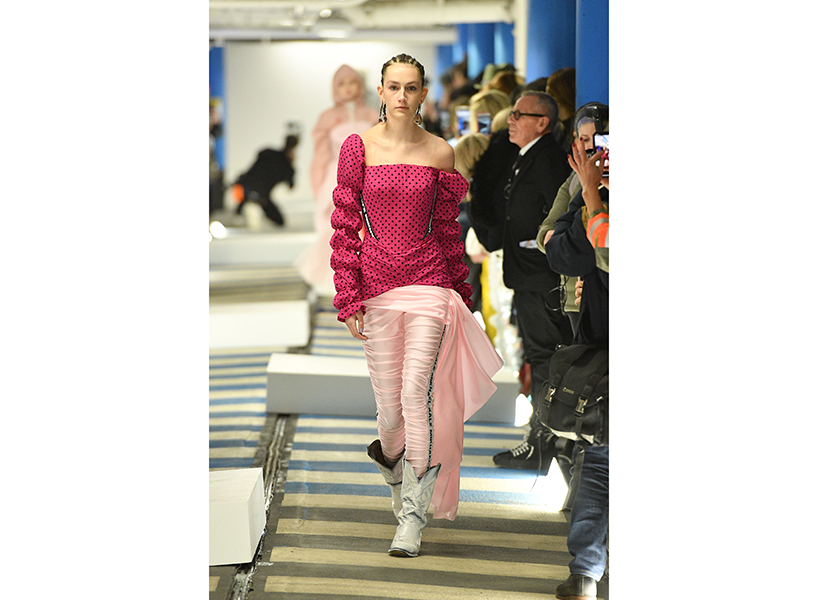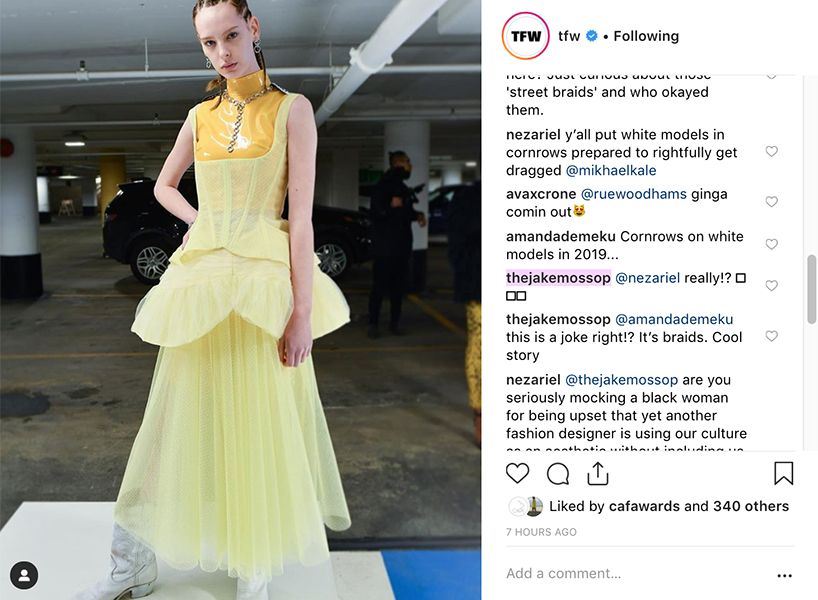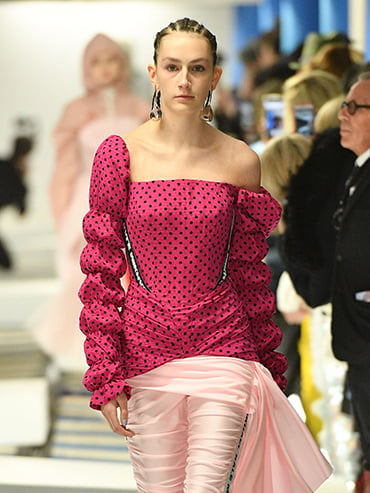The Response to Mikhael Kale’s Show Suggests the Toronto Fashion Scene Has No Desire to Change

It’s been a few years since anything at Toronto Fashion Week, in its various iterations, generated the kind of buzz it did last week. In fact, the last time our humble runway shows elicited any greater response than polite applause was probably in 2014, when Joe Fresh brought in Solange for a surprise performance. (I left early that night—still regret it.)
Admittedly, I don’t attend the shows with the same fervor as I did back when I was a young fashion editor and, in fact, only made it to one presentation this season. So I wasn’t there in person to witness the white models wearing cornrows at Mikhael Kale’s show on Tuesday night. But I heard about them almost immediately thanks to a handful of Black women who called out the designer on TFW’s Instagram.
The post, a recap of Kale’s presentation, described the models’ hairstyles as “street braids” (yep, that actually happened), and by the following day the comments had given way to a heated argument, primarily between a few vocal women and Kale’s self-identified boyfriend, Jake Mossop, who mocked the women for their indignation.

“Cornrows on white models in 2019…” wrote Amanda Demeku, a Black woman who works in media (and, full disclosure, is a FLARE contributor). Mossop replied: “This is a joke right? It’s braids. Cool story.”
“Y’all put white models in cornrows prepare to rightfully get dragged,” commented Nezariel Scott (a former FLARE employee, who also identifies as Black). Mossop replied, “really!?” with three laughing emojis, and later “sorry you’re so angry. Bye!”
Neither the designer himself nor the lead hair stylist for Toronto Fashion Week, Redken’s Jorge Joao, weighed in. But several minutes later, Mossop’s comments were deleted. Hours later, the entire TFW post was removed, effectively shutting down any chance for constructive debate or (obviously much-needed) education on the topic of cultural appropriation.
Obsessively watching the whole thing go down, I questioned the purpose of fashion week in general (something that FLARE will be digging deeper into later this month—stay tuned). If we can’t have critical discussions about the collections, then why are we attending them? It’s one thing to look past an unfinished hem, a poorly-constructed top or a reductive concept because you really want to encourage nascent local talent. But when we start to shut down critical conversations about representation and inclusion, overlooking designers’ shortcomings becomes detrimental in a way that is, frankly, embarrassing.
Kale wasn’t the only designer to face backlash this past week. Gucci made international headlines for selling a high-fashion balaclava that was criticized for resembling blackface. The difference in these two cases is that Gucci quickly pulled the garments from its online and offline stores and issued an apology: “We are fully committed to increasing diversity throughout our organization and turning this incident into a powerful learning moment for the Gucci team and beyond.”
At first I was surprised by Gucci’s swift and seemingly sincere statement. After all, it was only a year ago that creative director Alessandro Michele had his own appropriation moment, sending white models down the runway wearing headgear inspired by Sikh turbans. Perhaps the widespread criticism the brand faced back then, including from actor Avan Jogia, a former model for Gucci, was a learning experience. It certainly wasn’t the first time a fashion brand has been accused of appropriation, but what did feel new was that the audience—from potential customers to fashion editors to the general public—was no longer standing for it.
Gucci’s recent apology was likely issued so quickly because the online debate surrounding the accessory in question was amplified by influential players, such as the Instagram account Diet Prada. Messages reached the brand, loud and clear, and couldn’t be ignored or dismissed. But because Canadian fashion shows rarely grab international attention, the conversation around Kale’s misstep seemed to die when the TFW Instagram post was deleted.
So I was jump-out-of-my-seat pumped when, Refinery29 Canada published an essay by Kathleen Newman-Bremang, in which the writer discusses her decision, as one of the only Black journalists at Kale’s show, to take on the emotional labour of writing about the designer’s appropriation of Black hair styles—something other outlets ignored or, at best, included as a footnote in their reviews.
“Here’s the part in the story when I, as a Black woman in media, have to decide whether or not I’m going to let something like this get to me,” Newman-Bremang wrote. “‘This’ meaning the blatant cultural appropriation of taking a hairstyle that Black women all over the world have been mocked for or told that they are ‘unprofessional’ for wearing and using it on white models to sell clothes. I have to decide whether I’m just going to shake it off or if I’m going to use my time and energy to call it out.”
I’m grateful that she did, and hoped that Kale, his team and the wider fashion community would have taken her message to heart, maybe even learned something from it. Unfortunately, that’s not what happened.
In an Instagram post on his public page, tagging Newman-Bremang and Refinery29, and hashtagging a slew of other media outlets, Mossop wrote a response to the article, insulting Newman-Bremang’s journalistic integrity and dismissing her valid criticisms as an attempt to “[make] a few hundred bucks.” (Kale did not issue a response himself, but did like the post and comment on it with a selection of emojis.) Several people in Mossop’s circle, including a few influential figures in Toronto’s fashion scene, liked and supported the post, which was disheartening, to say the least. But it also reiterates the need for other honest, critical reviews of these fashion shows, not just (often insincere) praise that enables a designer, and his team, to feel justified in trolling the few women that called them out.
It also highlights the need for online venues, like Diet Prada, that can act as neutral territory for these discussions and education to occur. Until it was deleted, that venue in this case was Toronto Fashion Week’s Instagram post. I reached out to the organization about why they decided to take it down, essentially censoring the criticism of Kale’s show. I received the following comment:
“Per the designer’s request, we removed the post and we want to apologize for any offence it caused. As Canada’s largest Fashion Week, it is incredibly important to us that we continue to represent and work with people of all backgrounds as we always have. From the models on the runway to the designers behind the scenes, we will continue to strive for inclusiveness and proper representation in everything we do.”
I also reached out to Kale’s team but have not received a response.
I did, however, speak to Newman-Bremang over the phone, who told me, “My intention was to hold the designer accountable, and to call out the appropriation that continues to happen in the fashion industry.” She too reached out to Kale for a comment when writing her piece, but did not hear back from the designer or his team. “When something like this happens and people from a marginalized group make their voices heard on a platform [Instagram] that has given Black women voices when they haven’t had one in the past, the only right thing to do is listen,” the writer said. “Shooting them down and not acknowledging their comments is not how we’re going to move forward.”
She’s right about more than one thing. If we want the Canadian fashion industry to actually move forward, we have to start holding designers to higher standards. Fashion, like any art form, is an avenue to push boundaries, inspire creativity and reflect our collective values. And in this context, runway shows deserve both praise and critique. Without encouraging the latter, especially in this case, what’s the point?
Related:
Fashion Has Been Obsessed With Turbans for Centuries… and It’s Still Not OK
When Kendall Was Accused of Wearing an Afro + Other Dubious Kardashian Decisions
“Curls Are a Form of Therapy”: 5 Black Women Reflect on Their Hair
The post The Response to Mikhael Kale’s Show Suggests the Toronto Fashion Scene Has No Desire to Change appeared first on FASHION Magazine.
